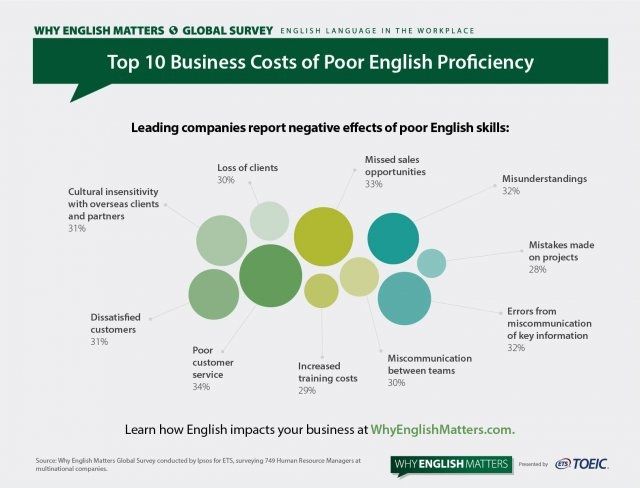Why is English important (at work)?

Improving your English is not just a good idea, it is now a must. We must improve our Speaking, Reading, Writing, and Listening.
For example: I walked into an office in Taiwan a couple of years ago. As usual, I slip by the security desk with a simple “我上課” (Wǒ shàngkè Translation: I have an English class). I am guided to the 7th floor and to a conference room ready to begin class with the Branch Manager, ALL without anyone greeting me, asking me any questions, or even making eye contact. I explained to their Managing Director that this was a common occurrence; I’d been having weekly lessons for four months helping him improve his communication with the new CEO, a foreigner from Canada. The new CEO would be visiting in a couple of weeks. However, some questions kept popping up in my mind: What if I wasn’t just “an English teacher?” What if I was a prospective client, and important vendor, or even the new CEO? It wouldn’t have left a good impression if the entire company ignored the ‘foreigner’ visiting the office.
This was a shocking wake up call to the Director. How many deals were not closed because of English? How many job opportunities were missed? How many errors have been made because of miscommunication?
How does English Impact Our Business According to HR managers
English impacts our businesses in many ways. A recent survey of HR Managers at multinational companies conducted by the ETS (The people who create the TOEIC and SAT Exams) revealed the negative impact of poor English at work. Let’s look at real ways international businesses are affected by poor English proficiency.

Poor customer service 34%
Sometimes I call a company and it takes 3-5 minutes before someone can help me. Most of the time I need to call back because the first call wasn’t helpful or led nowhere. Poor customer service can turn away potential customers, but good customer service leads to greater customer satisfaction and engagement. Personally, I chose my bank because their app was in English, so that way I never have to call a customer service line again.
Missed sales opportunities 33%
Building great relationships with partners leads to more lucrative sales. To be able to build relationships with people, you need to be able to speak with ease, not just in professional settings, but also in small talk settings. You never know what opportunities you missed because you couldn’t communicate clearly with someone.
Misunderstanding 32%
One day I asked my staff, “Can you send some documents to a client for me?”. My staff said to me “Yes, I can’t”. The next day the client had not yet received them. Often Asian second language learners don’t enunciate the last syllable or omit the ‘t’ sound, so I heard, “Yes, I can”. Needless to say, as a rule, in our office we stopped using contractions.

Errors from miscommunication of key information 32%
How many students will be attending our workshop on Tech Presentations? There is a big difference between 15 (fifteen) students and 50 (fifty) students. Or how much is that project worth? $15,000 or $50,000? Mispronunciation of numbers have caused big headaches with our finance team and when negotiating with clients.
Cultural Insensitivity with overseas clients and partners 31%
I usually banter with my teachers and with other students, but humor and tone can sometimes be misinterpreted. One day after class, another student was talking about how he had to work over the weekend. I jokingly said that he shouldn’t have to work at all and that I would never let my boss make me work on a weekend. Something in the way I made those comments triggered him to come back to the office 15 minutes later very upset with me. I apologized for “just joking” but he would not accept my apology. I had caused him to “lose face” with my jokes. That day, I learned the importance of taking a person’s cultural context into account before speaking. Find a middle ground so that you don’t make the same mistake.

Dissatisfied customers 31%
I hated using my old banking app and their ATM’s. When my friend suggested to switch to her bank, which uses an English app, I quickly switched over without a second thought. I know for many English speakers living and working abroad, satisfaction with who they choose as service providers is dependent on whether English language services are available or not.
Loss of clients 30%
A student of mine said she had lost multiple clients because of her team’s lack of English ability. Most of the time, her team would wait for her to solve the client’s issue, instead of solving it themselves, adding to her workload, but also delaying response time to handle client problems. If their English proficiency was better, they would have been able to handle more international clients.
Miscommunication between teams 30%
A client of mine has a team made up of two Chinese speakers, one Russian, and one Israeli. He has found it very challenging coordinating the work between them. He has to constantly help his team communicate with each other and with other teams in the organization.
Mistakes made of projects 28%

Errors with language may happen and are unavoidable, but should be avoided on important things like contracts and projects. I once saw a large sign at the international airport: “Eating Carpet Strictly Prohibited”. Google Translate is your friend, but you should always get documents proof read before finalizing them.
Increased training costs 29%
I often tell my students the goal is to not need me anymore. I’m a resource for them to one day be able to learn and grow on their own. Not only does language training take time, but can often be difficult when training employees of different language levels and abilities. We often have to separate students into three groups: beginner, intermediate, advanced. But it would be more cost effective to just do one training session with everyone.
Globalization is one of many reasons to move to improved English at work. When hiring employees, companies are closely evaluating talent and their English abilities. Sometimes a decent TOIEC score is enough, but TOEIC doesn’t measure some of the concerns that HR Managers mentioned in this survey. Not to worry though, Vine has created a candidate & employee testing tool for hiring managers called EEP.
What is EEP?

EEP is an all-in-one online English exam that Hiring Managers can use to check performance, potential, and promotion opportunities. HR managers simply send the candidate a link to a custom made exam created by Vine, for the position they’re looking for, and will receive a report within 24 hours that checks not only the candidate’s speaking, reading, listening, and writing abilities, but also their pronunciation, presentation skills, and fluency. The report will also include how these candidates compare to their company averages overall as well as the national average. This is an exam that we have been developing and tracking for the past 5 years. Now, it’s just a lot more convenient.
To find out more, you can contact me directly for a demo: russ@vineec.com











